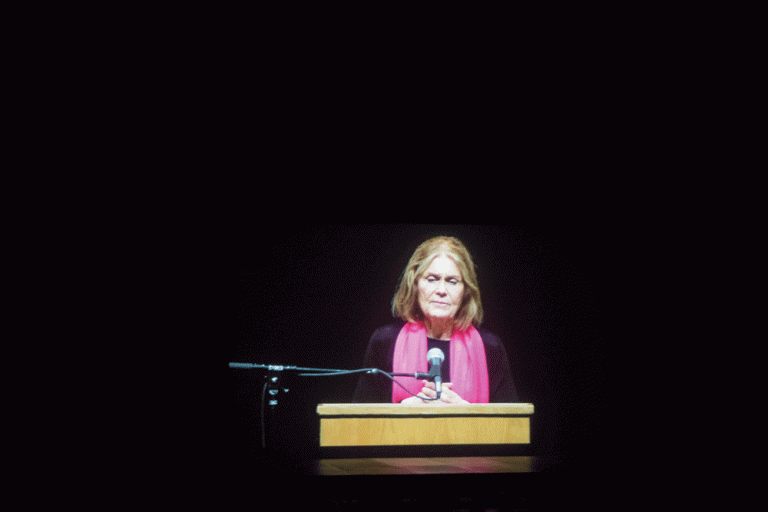
Jack Shea
Staff Writer
When the time came for Gloria Steinem to come to the stage Thursday night, the Santa Barbara Arlington Theatre and UCSB’s Campbell Hall (through simulcast) awoke to words of encouragement in feminist critiques of history and the current political climate.
Steinem spoke about her work in the Women’s Movement, her books, and how her personal connections shape her influential work. She congratulated her audiences for coming out and showing that they care about social justice issues. Steinem even praised California’s politics, arguably the country’s most progressive, to remind activists of the political positives. Optimism didn’t fail to shine through her words in a time of predominantly disheartening politics.
Steinem educated her audiences on what it means to partake in a “full circle of activism.” Activism is communal and involves listening to all of the human senses. It realizes the social, physical, and biological responses to the world’s events and how they turn on a sense of human and spiritual understanding within activism.
“When we, male or female hold a baby, we’re flooded with oxytocin, and empathy, and bonding. When we see a member of our species endangered [or] in an accident, we feel a human impulse to help even though we do not know that person. That only happens — I asked my neurologist friend — that’s only produced when we are together, with all 5 senses, as we are tonight,” said Steinem. This physiological experience is what leads to activism of the senses and its “full circle.”
Steinem used her platform to let listeners know she’s an ordinary human, like them, pursuing ordinary endeavors. “Just do what you can; we are powerful,” Steinem said. She ushered her audiences into empowerment, letting them know that activism is not a complex thing.
Steinem’s words of empowerment eased anxiety oozing from the audiences. “When groups are invisible, we need to rise up and say, ‘Here I am,’” encouraged Steinem to not fear new threats to progress inside and outside America.
Being a feminist writer, Steinem, reminded the audiences that “no program overseas that performs, even refers, or mentions abortions can get US funds. A woman dies every five minutes … Now we will demystify and take all the power away from Trump tonight.” Although Steinem admitted that society is in trying times, she encouraged her listeners through her strong assertions, critiques of history, and dedication to change.
“The Chinese did not bound the feet of poor women. They bound the feet of rich women because women, of the upper class, are way more likely to be trained to be dependent on a man’s income,” referenced Steinem.
She connected this use of oppression to Trump’s margin of victory among white female voters. She cited statistics on how Trump won the popular vote of married white female voters as a way to prove that oppression needs to control reproduction.
Such bold critiques did not cease at gender oppression. Steinem asserted that she had hope for the future. This previous election has “unified/activated people in a way I have never seen in my life,” she said.
Steinem referred to the “energy” that she feels now as a way to explain the current shifts in movements and ideas. For example, Steinem sees the Women’s March and the excitement of her friends’ political science students, who are getting into politics now more than ever, as strong reasons for hope.
Regardless of the current political and social climate, Steinem reminded the Santa Barbara community that life can be interpreted however the individual wants. One can choose to allow anxiety to rule their thoughts so deeply that depression prevails. Alternatively, one can stand up in pursuit of personal and societal accomplishments never forgetting the positive accomplishments of the past.
Activism can happen now. During a time when facts and fiction commingle in some powerful people’s mentalities, values of honesty and intellectualism call for activism. “The [lack of] difference between fact and fantasy” dominating American politics is a threat to all of society, according to Steinem.
“If you just took where we started, all the social justice movements … We need to understand [progress from social justice movements] is possible,” proclaimed Steinem. “We can do it again.”










